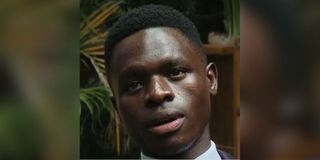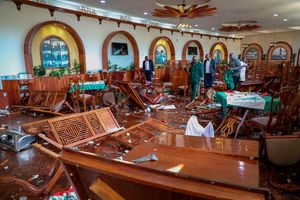
Joshua Okayo, Kenya School of Law student leader, during the interview.
When Joshua Okayo, the president of Kenya School of Law (KSL), was thrown from the boot of a moving vehicle to the ground, he lay by Maragua River in Murang'a County, too weak to move.
"They threw me out of a vehicle they drove me. I rolled several times. I had no energy to do anything and had to stay there for some time. At that time, I was very weak. I had lost consciousness," said Mr Okayo.
Mr Okayo was abducted on Wednesday, June 26, and released on the morning of Friday, June 28, 2024.
Since his release, the Nation has been trying to contact him to share his ordeal until Tuesday when he agreed to meet us at Rustic Haven, a busy hotel in Ong'ata Rongai, Kajiado County.
He said his abductors blind-folded him as soon as they picked him up from his rented flat at Olerai in Rongai, and when they threw him out of the car, they left him with the black bag still tied tightly around his head.
According to him, he does not know how long he stayed by the river, but he was awakened by an eager crowd.
"Someone woke me up and when I looked up, although it was a struggle, I saw a whole village around me. They were speaking Gikuyu. They were so kind and really helped me. It is because of their efforts that I am alive today," he said.
Narrating the genesis of his predicament, Mr Okayo said that on Tuesday, June 25, he joined some of his friends in the protests that saw the youth storming Parliament Buildings in Nairobi.
The protests, he said, were not just about the 2024 Finance Bill, but about a number of vices—including corruption within government, and that not much was being done to address the whole issue.
"The Gen Z youths realised that we have a lot of rot in some departments of the government, especially corruption and appointments of people who are not qualified to jobs, which is illegal," Mr Okayo said, adding that awarding tenders without following the procedure as per the law was also part of the problems they wanted addressed.
He said life had become very difficult for almost every Kenyan, and that some of his colleagues had dropped out of school because of financial constraints.
The student leader said that during the protests, one of his friends would remind them that there were three possible outcomes if they stormed Parliament.
The first was that some would be shot dead, others would be injured, and others would make it and leave as they came.
"During the protests, the majority of the participants said it was better for them to die but make sure their voices were heard," he said.
Mr Okayo said he was a very secretive person, and that the videos showing him as part of the protesters were taken by other people.
He does not deny that he did not have a chance to enter Parliament that day, and that when he realised that the police were using live bullets during the clash, he had to choose a cartridge.
A cartridge is a tube (made of metal) containing a full charge for a firearm, and usually a primer.
"I saw one of the demonstrators shot dead. It was out of pain that I chose this spent cartridge, which I will keep for my children and grandchildren. I will tell them what happened," Mr Okayo said.
Moments after the protesters stormed Parliament, he said they were informed that military officers had been deployed and that was when he made the decision to return home.
He said he was even advised by his friend, Ruth Ambogo, that it was very necessary for him to leave Nairobi's Central Business District (CBD).
As he was heading back to his house, he received a call from another friend asking him to go back and meet him at City Hall.
"When I got there, the friend said they had decided to storm State House as well. While we were having this conversation, another friend called me and asked me to leave the city and go home," he said.
It was then that he remembered that he had been informed that some people were looking for him after he had issued a press statement calling on those who had abducted two KSL students to release them immediately.
Mr Okayo said he then decided to leave the city immediately and return to his home. A friend offered to drop him off at his home, so he agreed and made his way to Rongai.
"I also switched off my mobile phone because I was afraid that people looking for me might track my movements," he said.
However, due to the heavy traffic in Rongai, the friend dropped him off in a safe place and he decided to walk home.
As he was walking, Mr Okayo said he heard someone calling his name loudly but he did not look back. Instead, he decided to run because he thought the people looking for him were the ones who had called him.
"They kept calling me as they ran close behind me. Then I recognised one of the voices and stopped. They were my classmates," he said.
When asked why he was running away, he told them that he had been made aware of some people who were looking for him and that he believed they were up to no good.
They then decided that he should go with them to their house, where they had dinner together as they discussed what had happened that day.
"At midnight, I told them I had to go to my house as there was no reason to worry," he said.
At home, he turned on his mobile phone and found several messages from friends and family asking if he was safe.
He assured them that he was fine and had already retired to bed.
The next morning, as he was getting ready for school, he met three men who asked him to say hello.
"They then forcibly bundled me into a waiting car and I was blindfolded with a sackcloth while the driver, who was sitting in his seat the whole time, drove off at breakneck speed," he said, adding that they also took his mobile phone.
He said that for 30 minutes, the people who abducted him never said anything and remained deadly silent.
However, when they began to interact with him, they only asked for details of the protests.
"They asked me why people were protesting and my answer was simple, we were doing it in solidarity with the others who had decided to come out and fight for the rights of Kenyans," said Mr Okayo.
He said they wanted to know who were the financiers of the whole protest and why KSL students were in the forefront.
According to him, they even questioned why he had issued a press statement demanding the release of the abducted KSL students and who was informing the youth that it was the International Monetary Fund (IMF) that had drafted the 2024 Finance Bill.
"They would ask a question, then be silent for a while before asking another question. All these questions were related to the protests," he said.
After driving him around for two hours, they pushed him out of the vehicle and walked for a few minutes before he was bundled into the boot of another vehicle.
He said he was blindfolded the whole time.
He said that the vehicle he was in was driven for two hours and that he could not hear them say anything. Moments later, he was forced out of the car and thrown into a dark room.
As he shed tears and wiped them with a handkerchief, Mr Okayo said that they left him there alone and that he was very hungry and thirsty.
“They had not handcuffed me and I was still blindfolded. That was when the reality sank in that I had been abducted and was about to experience the worst moment of my life," he said.
According to him, the kidnappers stayed for over an hour and when they returned they began to assault him, asking him the same questions they had asked him in the first car.
He asked them to give him water but they insisted that he must answer all their questions.
Mr Okayo said that at one point, they strangled him and beat him on his chest, legs and ankles.
The student leader said the abductors could leave again and come back after some time just to ask the same questions and beat him up.
When asked if he could tell if they were police officers or not, Mr Okayo denied it, saying that to date he could not tell who his abductors were.
On Friday morning, they took him out of the room and bundled him into a car, which drove for a few minutes before he was thrown out.
"I was very weak, but those who found me handed me to a boda boda rider," he said.
Mr Okayo said that the night before he was abducted, a classmate told him that it would be okay if he wrote down some phone numbers on a piece of paper because he had been informed that people were looking for him.
These were the phone numbers that the people who found him by the river called, and he was put in touch with his brother.
According to him, the people who kidnapped him returned his mobile phone, but they had taken his two SIM cards and had also taken some money from one of them.
They also uninstalled WhatsApp app from the phone.
When he left with the bodaboda, he was taken to a hotel where he had a meal before reporting the matter to the Murang'a County Police.
He was then taken to a private hospital in Thika for medical examination.
Mr Okayo also said that his abductors told him that if he gave them some information, they would be willing to make an offer without being too specific.
"They wanted me to give them more information, but I did not know any of the details they were asking for. Honestly, I could not trust them and I knew in my heart that I was fighting for the right thing. I could not have walked away from the protests," he said.
He maintained that as long as it was constitutional for people to protest whenever something was not right, he would ensure that he joined such movements aimed at making Kenya a great country.
"I will continue to support anything that is good for Kenyans. I also appreciate the people who have come out to support me. And those who rescued me from where I was thrown and left to die," he said.
He also said that his parents had asked him to stop the protests as they were causing more harm than good, but that one of his brothers fully supported him.
On Tuesday, the government said it would investigate and prosecute all those, including police officers, involved in the abductions, disappearances and arbitrary arrests of Kenyans during the protests that have rocked the country over the past three weeks.
Interior CS Kithure Kindiki said all persons living in Kenya were protected from unlawful or arbitrary detention, abduction and enforced disappearance.
"The government reiterates its commitment to respect and ensure the protection of all constitutionally guaranteed rights and will not tolerate any violation whether perpetrated by security personnel or by public or private persons," Prof Kindiki said.
He also warned people against taking advantage of the peaceful protests to cause damage through vandalism and looting of property.







